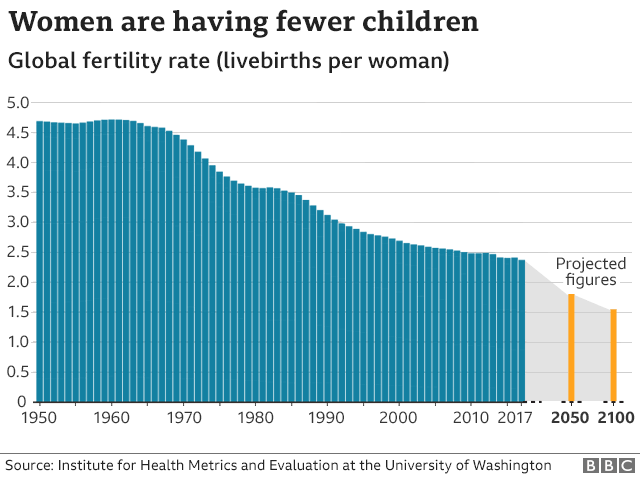|
|
Post by jandl100 on Jul 15, 2020 13:18:18 GMT
"By the end of the century, the world will be multipolar, with India, Nigeria, China and the United States the dominant powers," said Richard Horton, describing the study as outlining "radical shifts in geopolitical power." - new global power alignments shaped by declining fertility rates and ageing populations. - "Continued global population growth through the century is no longer the most likely trajectory for the world's population." www.aljazeera.com/news/2020/07/population-20-countries-halve-2100-study-200715061706992.html |
|
|
|
Post by MartinT on Jul 15, 2020 13:44:32 GMT
Children of Men may yet come true.
I wonder if we'll ever be a unified planet?
|
|
|
|
Post by Slinger on Jul 15, 2020 14:03:05 GMT
Children of Men may yet come true. I wonder if we'll ever be a unified planet? All the while we can't even manage to be a unified Europe, possibly not. |
|
|
|
Post by jandl100 on Jul 15, 2020 14:47:50 GMT
www.bbc.co.uk/news/health-53409521"What is going on? The fertility rate - the average number of children a woman gives birth to - is falling. If the number falls below approximately 2.1, then the size of the population starts to fall. In 1950, women were having an average of 4.7 children in their lifetime. Researchers at the University of Washington's Institute for Health Metrics and Evaluation showed the global fertility rate nearly halved to 2.4 in 2017 - and their study, published in the Lancet, projects it will fall below 1.7 by 2100." 
|
|
|
|
Post by MartinT on Jul 15, 2020 15:11:00 GMT
In 1950, women were having an average of 4.7 children in their lifetime. Astonishing. No wonder we're over-populated (this country and the world). There should be a limit of two. Two people creating two children. Zero growth and, hopefully, a fall because not everyone will have children. |
|
|
|
Post by jachawk on Jul 15, 2020 16:32:04 GMT
The planet is over populated so good news then
|
|
|
|
Post by jandl100 on Jul 15, 2020 17:07:41 GMT
Yes, good news in the longer term.
But in the short term it may get very messy as governments and individuals have to cope with increasingly older populations.
Economies could tend toward collapse under the burden of too few 'earners' and too many pensioners. It could well get quite unpleasant for quite a lot of individuals with the state being unable to afford the upkeep of so many old codgers placing increasing burdens on health and social care systems.
|
|
|
|
Post by MartinT on Jul 15, 2020 19:02:31 GMT
COVID will take care of the burgeoning elderly population.
|
|
|
|
Post by Slinger on Jul 15, 2020 19:57:58 GMT
It would be far more interesting - not to mention far more useful - if we could see that data split by country, or even by continent.
|
|
|
|
Post by Mr Whippy on Jul 15, 2020 20:03:50 GMT
Yes, good news in the longer term. But in the short term it may get very messy as governments and individuals have to cope with increasingly older populations. Economies could tend toward collapse under the burden of too few 'earners' and too many pensioners. It could well get quite unpleasant for quite a lot of individuals with the state being unable to afford the upkeep of so many old codgers placing increasing burdens on health and social care systems. Every problem has it's solution: And abortion rates not a factor? Currently 30 - 40 million a year, according to the WHO. |
|